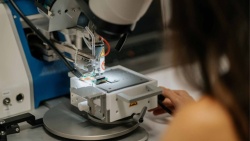The Institute of Materials Science of Barcelona (ICMAB-CSIC) is a leading research centre in Advanced Functional Materials and Nanomaterials in Catalonia, Spain and Europe, internationally recognised and accredited as a Severo Ochoa Centre of Excellence. Our mission is to generate knowledge in the field of Materials Science and Nanoscience through advanced research and utilisation for society, industry, economy and employment in Europe. ICMAB has more than 30 years of experience in the synthesis and characterization of materials with applications in various industrial sectors, such as biomedicine, energy, and electronics. We compete with five research lines on topics of net and safe energy, superconducting materials, oxides for electronics, molecular electronics, and functional biomaterials and nanomedicine.
RESEARCH LINES
1. SUSTAINABLE ENERGY CONVERSION AND STORAGE SYSTEMS
RL1 focus is on next generation materials for renewable energy generation, such as photovoltaics and thermoelectric systems, and for energy storage, such as batteries or supercapacitors.
Critical and toxic materials are replaced by others in the field of metal organic frameworks, oxide-nitride layers, carbons and polymeric materials.
2. SUPERCONDUCTORS FOR POWER APPLICATIONS
RL2 is devoted to creating high quality high-current superconducting tapes to enhance the efficiency and reduce the environmental impact in electricity transport, distribution, generation and use.
Our superconducting long length tapes are achieved through low cost manufacturing processes, while keeping high functional performances suitable for industrial applications.
3. OXIDE ELECTRONICS
RL3 is devoted to the study of transition metal oxides, considered to be the building blocks for efficient, and energy friendly data storage, advanced computing and energy harvesting devices.
We focus on the development of thin films with subnanometric precision, and use the most advanced tools of lithography for device microfabrication, prior to electrical, magnetic and optical characterization.
4. MOLECULAR ELECTRONICS
RL4 focus is on the fabrication of organic semiconductors and their applications in molecular electronics, to create devices with a strong impact on the wellbeing of society, regarding technological advances and health.
Organic molecules in electronic devices are arousing enormous interest due to their unique advantages for designing tailored functional materials, low-cost production processes, biocompatibility and biodegradability.
5. MULTIFUNCTIONAL NANOSTRUCTURED BIOMATERIALS
RL5 aims at providing key inputs in two of the current nanomedicine challenges with strong societal wellbeing impact, especially in health: therapy and diagnosis, and tissue repair.
Smart functional nanomaterials for drug delivery or biocompatible nanostructured materials based on graphene, magnetic nanoparticles or functional surfaces for tissue and neural repair are some of the main examples.



